Whey and casein and soy, oh my!
The selection of protein powders on the market can be overwhelming — there are dozens of popular brands and scores of popular products.
Which should women buy, and why?
Should you choose an animal-based protein powder like whey or casein or egg? Or maybe a plant-based protein powder like rice, soy, hemp or pea is best for you? Or a combination or blend, maybe?
Well, by the end of this article, you’re going to have simple and definitive answers to all those questions and more.
You’ll understand the pros and cons of each type of protein powder and how to determine which is going to fit best with your needs, preferences, and goals.
Let’s get started, shall we?
- Protein Powder 101
- What's the Best Protein Powder for Weight Loss?
- Which Protein Powder is Best for You?
- The Bottom Line on the Best Protein Powder for Women
Table of Contents
+Protein Powder 101

A good protein powder meets a few criteria:
- It doesn’t have to taste like a milkshake, but it should taste good and mix well. If you have to choke it down, you’re going to have trouble sticking with it.
- It should have a good macronutrient profile, meaning it should have the most protein for the fewest calories and be as low in carbs and fat as possible.
- It should be affordable and offer good value in terms of cost per serving.
I also believe it’s beneficial to choose a powder that doesn’t contain artificial sweeteners, food dyes, or other junk, simply because it helps reduce our overall exposure to these chemicals.
Once a powder has passed that test, the next step is to consider your preferences and goals.
And let’s start with the goal that most women asking about protein powder have: weight loss.
What’s the Best Protein Powder for Weight Loss?
Here’s a sad truth in the health and fitness space:
If you want to increase sales of any pill, powder, or program, all you have to do is tell people it’ll help them lose weight.
That’s why “weight loss” has been bolted on so many different products, ranging from protein bars to pre-workout drinks to the subject at hand, protein powders.
And I hate to be the bearer of bad news, but…
There’s no such thing as a “weight loss protein powder” because none can cause you to lose weight.
“Weight loss foods” doesn’t exist either because weight loss isn’t about the foods you eat, per se — it’s merely a byproduct of properly regulating your caloric intake and energy balance.
That said, certain foods are more conducive to weight loss than others.
This boils down to the amount of calories foods contain and how those calories break down into protein, carbohydrate, and fat.
Generally speaking, the best foods for weight loss are those that provide an abundance of micronutrients and are filling while also being relatively light in calories and in dietary fat and added sugar in particular.
When you focus on eating these types of foods, you’re much less likely to struggle with hunger issues and overeat.
For example, my favorite “weight loss foods” are…
- Low-fat varieties of protein like lean types of meat (chicken, lean beef, fish, and so forth), low-fat dairy products, egg whites, and even grains and vegetables. While protein powder is convenient, it can leave you hungry if you have satiety issues.
- Whole grains like wheat, rice, oats, and barley.
- Vegetables like green beans, carrots, broccoli, and artichoke.
- Legumes like green peas and beans.
- Tubers like white potato, which is incredibly satiating, and sweet potato.
As you can see, we’re talking about a bunch of high-fiber, unprocessed foods that taste great, provide your body with plenty of micronutrients, and keep you full.
The foods you want to avoid when dieting to lose weight are those that are very calorie dense and high in dietary fat and added sugar, but which aren’t all that filling.
Highly processed junk food like chips, candy, cookies, and other “goodies” and caloric beverages fit this bill, of course, but there are quite a few healthy foods that do as well.
For instance, I love nuts, oils, and butter, but have to limit my intake of them while dieting because they pack a ton of calories and dietary fat without doing much of anything to fill me up.
The same goes for foods like dried fruit, chocolate, avocado, and whole-fat dairy – all foods I love, but that I avoid while dieting.
Drinking calories is also generally a bad idea when dieting to lose weight because caloric beverages — soda, sports drink, energy drink, fruit juice, and the like — just won’t fill you up like food will.
You can drink 1,000 calories and be hungry a couple hours later, but if you eat those calories, you’ll can be full for 5 or 6 hours‚ and especially if it’s a high-protein and high-fiber meal.
This is one of the reasons you can find a raft of studies linking sugar-sweetened drinks to weight gain.
Here’s how researchers from Purdue University put it:
“Based on the appetitive findings, consumption of an energy-yielding beverage either with a meal or as a snack poses a greater risk for promoting positive energy than macronutrient-matched semisolid or solid foods consumed at these times.”
Now, when we’re talking protein powders, the ones most helpful with weight loss would be those that are as close to pure protein as you can get.
To my mind, carbs and fats in protein powders are just wasted calories that are better allotted to whole foods.
Which Protein Powder is Best for You?
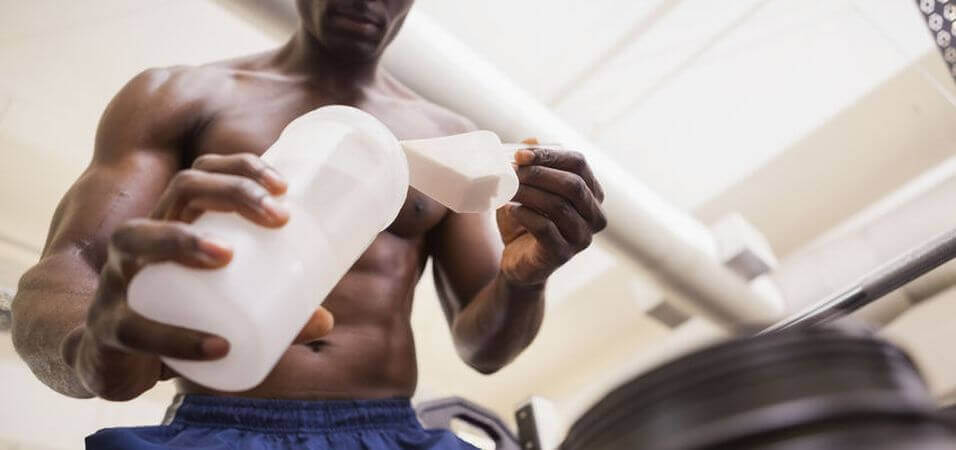
Now that we have the housekeeping out of the way, let’s get to brass tacks.
Specifically, let’s review each of the most popular types of protein powders on the market and see which is going to fit your needs best.
The Scoop on Whey Protein
Whey protein is Grand Poobah of protein powders, and for good reason.
It provides you with a lot of protein per dollar, it tastes good, and its amino acid profile is particularly suited to muscle building.
What is it, though, and what makes it special?
Well, whey is a translucent liquid that is left over after curdling and straining milk to make cheese.
Here’s what it looks like in its raw form:
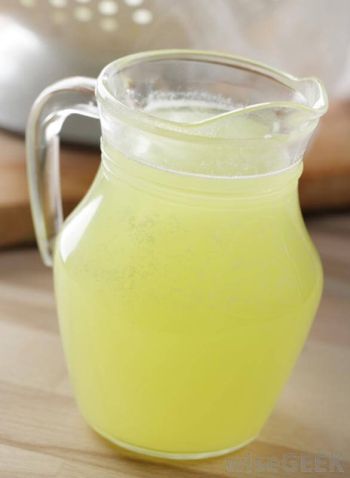
Whey used to be considered a worthless byproduct of dairy processing but eventually its high protein content was discovered.
(And now we know it’s one of the two types of protein contained in milk, with casein being the other.)
Scientists also discovered that whey is rich in the amino acid leucine, which plays a vital role in stimulating protein synthesis.
This makes it particularly good for maximizing muscle growth.
What’s more, whey protein is quickly digested, which means it causes a dramatic spike in amino acids in the blood when eaten.
This makes it ideal for post-workout supplementation (research suggests it may stimulate more immediate muscle growth than slower-burning proteins).
In short, whey protein is an excellent all-around choice for men and women who want to lose fat and gain muscle.
And if you’re going to buy a whey protein, you want to go with a whey protein isolate, which has the lactose removed and is more or less pure protein.
Mine is called WHEY+, and it’s 100% naturally sweetened and flavored whey isolate that is made from milk sourced from small dairy farms in Ireland, which are known for their exceptionally high-quality dairy.
I should mention, however, that even if you’re not lactose intolerant, you can be allergic to the actual proteins found in cow milk.
This is why some people don’t do well even with protein powders that have virtually all lactose removed.
If whey bothers your stomach, try a non-dairy alternative like egg protein or a rice and pea protein blend, which we’ll talk about soon, and you’ll be fine.
The Scoop on Casein Protein
Like whey, casein protein also comes from milk.
Unlike whey, however, casein is digestly slowly, resulting in steadier, more gradual release of amino acids into the blood.
There’s an ongoing debate as to whether whey or casein is better for gaining muscle, but here’s what most reputable experts agree on:
- Whey’s rapid digestion and abundance of leucine makes it a great choice for post-workout nutrition.
- Casein may or may not be as good post-workout as whey – the jury’s still out on this one.
- Casein is just as good as whey for general supplementation and muscle building needs.
- You can speed up muscle recovery by having 30 to 40 grams of a slow-burning protein like casein before bed.
I’ll usually eat 30 to 40 grams of whey protein in my post-workout meal and, for a time, was having about the same of egg protein before bed. I now do low-fat cottage cheese or Greek yogurt instead.
The Scoop on Egg Protein
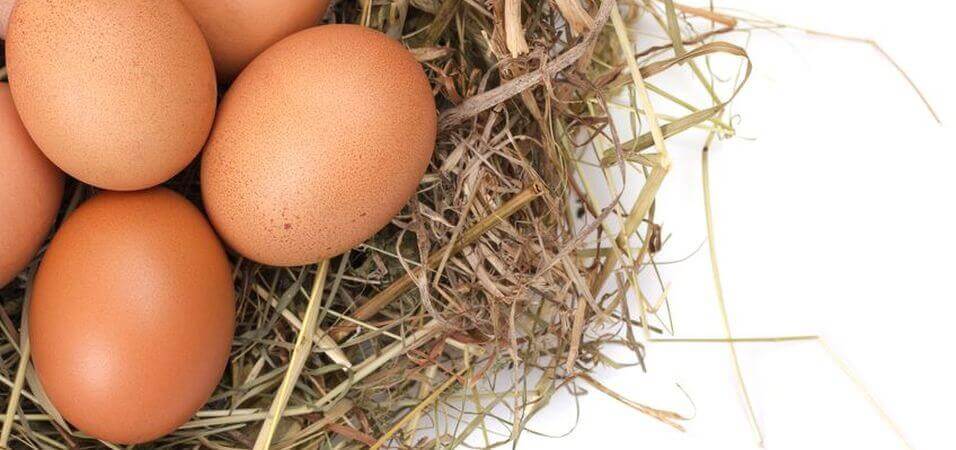
Many people don’t know you can even buy egg protein, and although it’s currently very expensive, I do like it for a few reasons:
1. It has a high biological value.
The biological value of a protein is a measurement of how efficiently it’s absorbed and utillized by your body.
As you can imagine, high-BV proteins are best for building muscle, and animal research suggests that egg is as effective as whey for this purpose.
2. It’s digested slowly (even slower than casein).
This means that egg is good for all-around supplementation, including before you go to bed.
There’s also evidence that eating more slow-burning proteins is better for muscle growth over the long term, but I don’t think the research is strong enough to really know one way or the other.
3. It has little-to-no fat and carbohydrate.
Egg protein powder is made from egg white so it’s naturally more or less carb- and fat-free. This means more macros for your food!
The Vegan Proteins
The protein found in many plants, vegetables, and grains such as rice, hemp, and pea is often thought of as inferior to animal proteins.
This is partially true, and not for the reason you’re probably thinking.
The most common charge leveled against plant proteins is that they’re “incomplete” and thus aren’t suitable for meeting the body’s protein needs.
This is a myth.
Research clearly shows that all protein found in plants and vegetables is “complete.”
That is, it contains all the same amino acids as animal proteins and can be used to fulfill our protein requirements.
Where plant proteins lose ground to animal proteins, however, is in absorption and amino acid profiles.
Namely, most forms of plant protein aren’t absorbed as well as animal proteins and are lower in essential amino acids.
This doesn’t mean you can’t get enough protein from plant-based proteins, though–this just means that you have to be more discriminating in your food choices than an omnivore.
With that, let’s find out which of the most popular vegan protein powders are best…
The Scoop on Soy Protein
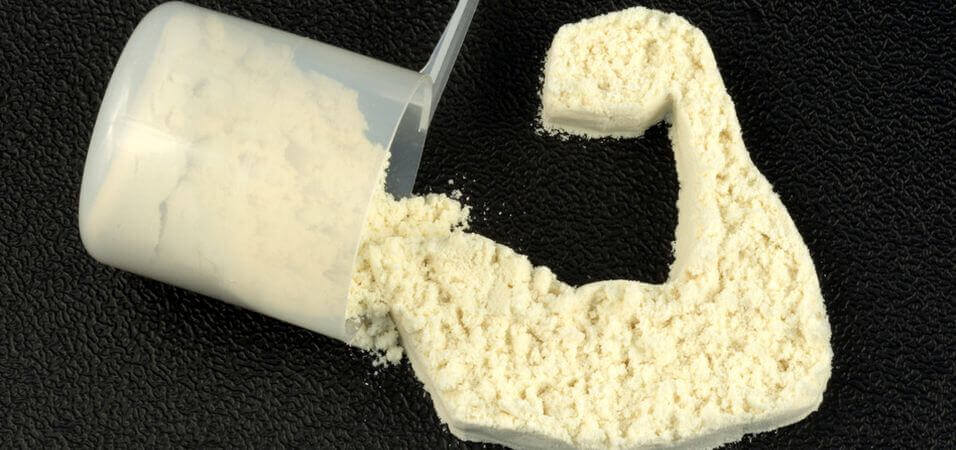
Soy protein is a mixed bag.
Research shows it’s an all-round effective source of protein for building muscle, but it’s also a source of ongoing controversy, and especially for men.
According to some studies, regular intake of soy foods has feminizing effects in men due to estrogen-like molecules found in soybeans called isoflavones.
For instance, a study conducted by scientists at Harvard University analyzed the semen of 99 men, correlated it with their soy and isoflavone intake during the 3 previous months, and found that both isoflavone and soy intake were associated with a reduction in sperm count.
Men in the highest intake category of soy foods had, on average, 41 million sperm/ml less than men who didn’t eat soy foods.
On the other hand, a study conducted by researchers at the University of Guelph had 32 men eat low or high levels of isoflavones from soy protein for 57 days, and found that it didn’t affect semen quality.
Furthermore, literature reviews like those conducted by Loma Linda University and St. Catherine University suggest that neither soy food nor isoflavones alter male hormone levels.
What gives, then?
Well, there isn’t a simple answer just yet but one promising line of research shows that soy’s effects in men can vary depending on the presence or absence of certain intestinal bacteria.
These bacteria, which are present in 30-50% of people, metabolize an isoflavone in soy called daidzein into an estrogen-like hormone called equol.
In a study conducted by scientists at Peking University, researchers found that when equol-producing men ate high amounts of soy food for 3 days, their testosterone levels dropped and estrogen levels rose. These effects were not seen in women, regardless of equol production or lack thereof.
Related to this is a study conducted by researchers at Sungkyunkwan University, which found that in a high-estrogen environment, isoflavones suppressed estrogen production, and in a low-estrogen environment, they increased estrogen production.
Now, in the case of women, research shows that it is less likely to negatively affect your hormones.
There are other things to consider, however.
Studies show that soy protein contains substances that inhibit the digestion of protein molecules and the absorption of other nutrients, as well as several known allergens.
While there is evidence that soy might have special benefits for women such as reducing the risk of heart disease and breast cancer, other studies cast doubt on these findings.
And to the contrary, soy can even stimulate the growth of cancer cells.
The bottom line is if you want to supplement with a protein powder several times per day, I recommend you go with something other than soy.
The Scoop on Rice Protein
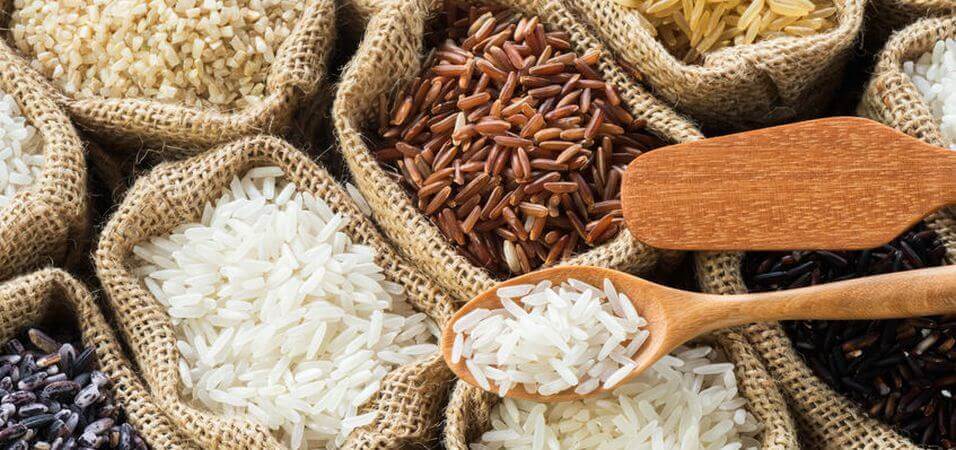
You may not think much of the protein found in rice – or even know it contained any protein too speak of – but it actually makes quite the viable protein powder.
Rice protein has a high biological value of about 80% (similar to beef) and a robust amino acid profile very similar to soy’s.
It also tastes mild and has a pleasant texture and mouthfeel, making it an all-around winner for protein supplementation.
And if you want to make rice protein even better, you can mix it with…
The Scoop on Pea Protein
Pea protein is theh real unsung hero of plant proteins.
I mean…when’s the last time you heard a meathead say that he’s eating a lot of peas to help bulk up?
Well, ironically, pea protein can help you do just that.
It has a high biological value (about the same as beef’s as well) and, like whey, it also has a large amount of leucine.
This makes pean protein great for muscle building purposes, and when you combine pea protein with rice protein, you get what’s often called the “vegan’s whey.”
This is because the amino acid profiles of pea and rice protein are complementary and, when combined, make something that, chemically speaking, looks a lot like whey protein.
The Scoop on Hemp Protein
Hemp protein is generally more popular than rice and pea protein but it shouldn’t be.
It’s highly nutritious but only about 30 to 50% protein by weight, which means it comes with a quite a bit of carbs and fat (and thus non-protein calories).
Furthermore, hemp protein isn’t absorbed nearly as well as rice or pea protein, making it even less useful as a protein supplement.
That’s why I look at hemp protein powders more as whole foods than protein supplements and don’t really recommend or use them.
The Bottom Line on the Best Protein Powder for Women
You now know everything you need to make good, informed choices about what protein powder will be best for you.
Here’s a recap:
- No one protein powder is unequivocally better for weight loss than another but less carbohydrate and fat in the powder, the better.
- Whey protein is particularly good for post-workout meals.
- Whey, casein, and egg are good for general supplementation, with casein and egg possibly being better for long-term muscle gains.
- A slow-digesting protein like egg and casein is good for having before you go to bed. Food works well for this as well (eggs, low-fat cottage cheese, and Greek yogurt are popular choices.)
- It’s probably a good idea to skip soy protein and go with something else instead.
- A blend of rice and pea protein is a great option for plant-based protein.
If you’re like me and like to keep things simple, get a whey protein and use a few scoops per day and get the rest of your protein from food.
What’s your take on the best protein powder for women? Have anything else to share? Let me know in the comments below!
Scientific References +
- House JD, Neufeld J, Leson G. Evaluating the quality of protein from hemp seed (Cannabis sativa L.) products through the use of the protein digestibility-corrected amino acid score method. J Agric Food Chem. 2010;58(22):11801-11807. doi:10.1021/jf102636b
- Mariotti F, Pueyo ME, Tomé D, Bérot S, Benamouzig R, Mahé S. The Influence of the Albumin Fraction on the Bioavailability and Postprandial Utilization of Pea Protein Given Selectively to Humans. J Nutr. 2001;131(6):1706-1713. doi:10.1093/jn/131.6.1706
- Kalman D. Amino Acid Composition of an Organic Brown Rice Protein Concentrate and Isolate Compared to Soy and Whey Concentrates and Isolates. Foods. 2014;3(3):394-402. doi:10.3390/foods3030394
- De Lemos ML. Effects of soy phytoestrogens genistein and daidzein on breast cancer growth. Ann Pharmacother. 2001;35(9):1118-1121. doi:10.1345/aph.10257
- Trock BJ, Leena HC, Clarke R. Meta-analysis of soy intake and breast cancer risk. J Natl Cancer Inst. 2006;98(7):459-471. doi:10.1093/jnci/djj102
- Anderson JW, Johnstone BM, Cook-Newell ME. Meta-analysis of the effects of soy protein intake on serum lipids. N Engl J Med. 1995;333(5):276-282. doi:10.1056/NEJM199508033330502
- Hisayasu S, Orimo H, Migita S, et al. Soybean protein isolate and soybean lectin inhibit iron absorption in rats. J Nutr. 1992;122(5):1190-1196. doi:10.1093/jn/122.5.1190
- Brandon DL, Friedman M. Immunoassays of soy proteins. In: Journal of Agricultural and Food Chemistry. Vol 50. ; 2002:6635-6642. doi:10.1021/jf020186g
- Kurzer MS. Hormonal Effects of Soy in Premenopausal Women and Men. J Nutr. 2002;132(3):570S-573S. doi:10.1093/jn/132.3.570s
- Hwang CS, Kwak HS, Lim HJ, et al. Isoflavone metabolites and their in vitro dual functions: They can act as an estrogenic agonist or antagonist depending on the estrogen concentration. J Steroid Biochem Mol Biol. 2006;101(4-5):246-253. doi:10.1016/j.jsbmb.2006.06.020
- Liu B, Qin L, Liu A, Shi Y, Wang P. [Equol-producing phenotype and in relation to serum sex hormones among healthy adults in Beijing]. Wei Sheng Yan Jiu. 2011;40(6):727-731. https://www.ncbi.nlm.nih.gov/pubmed/22279666. Accessed December 20, 2019.
- Frankenfeld CL, Atkinson C, Thomas WK, et al. High concordance of daidzein-metabolizing phenotypes in individuals measured 1 to 3 years apart. Br J Nutr. 2005;94(6):873-876. doi:10.1079/bjn20051565
- Hamilton-Reeves JM, Vazquez G, Duval SJ, Phipps WR, Kurzer MS, Messina MJ. Clinical studies show no effects of soy protein or isoflavones on reproductive hormones in men: Results of a meta-analysis. Fertil Steril. 2010;94(3):997-1007. doi:10.1016/j.fertnstert.2009.04.038
- Messina M. Soybean isoflavone exposure does not have feminizing effects on men: A critical examination of the clinical evidence. Fertil Steril. 2010;93(7):2095-2104. doi:10.1016/j.fertnstert.2010.03.002
- Beaton LK, McVeigh BL, Dillingham BL, Lampe JW, Duncan AM. Soy protein isolates of varying isoflavone content do not adversely affect semen quality in healthy young men. Fertil Steril. 2010;94(5):1717-1722. doi:10.1016/j.fertnstert.2009.08.055
- Chavarro JE, Toth TL, Sadio SM, Hauser R. Soy food and isoflavone intake in relation to semen quality parameters among men from an infertility clinic. Hum Reprod. 2008;23(11):2584-2590. doi:10.1093/humrep/den243
- Tang JE, Moore DR, Kujbida GW, Tarnopolsky MA, Phillips SM. Ingestion of whey hydrolysate, casein, or soy protein isolate: Effects on mixed muscle protein synthesis at rest and following resistance exercise in young men. J Appl Physiol. 2009;107(3):987-992. doi:10.1152/japplphysiol.00076.2009
- Young VR, Pellett PL. Plant proteins in relation to human protein and amino acid nutrition. In: American Journal of Clinical Nutrition. Vol 59. American Society for Nutrition; 1994. doi:10.1093/ajcn/59.5.1203S
- Boirie Y, Dangin M, Gachon P, Vasson MP, Maubois JL, Beaufrère B. Slow and fast dietary proteins differently modulate postprandial protein accretion. Proc Natl Acad Sci U S A. 1997;94(26):14930-14935. doi:10.1073/pnas.94.26.14930
- Norton LE, Wilson GJ, Layman DK, Moulton CJ, Garlick PJ. Leucine content of dietary proteins is a determinant of postprandial skeletal muscle protein synthesis in adult rats. Nutr Metab. 2012;9. doi:10.1186/1743-7075-9-67
- Res PT, Groen B, Pennings B, et al. Protein ingestion before sleep improves postexercise overnight recovery. Med Sci Sports Exerc. 2012;44(8):1560-1569. doi:10.1249/MSS.0b013e31824cc363
- Boirie Y, Dangin M, Gachon P, Vasson MP, Maubois JL, Beaufrère B. Slow and fast dietary proteins differently modulate postprandial protein accretion. Proc Natl Acad Sci U S A. 1997;94(26):14930-14935. doi:10.1073/pnas.94.26.14930
- West DWD, Burd NA, Coffey VG, et al. Rapid aminoacidemia enhances myofibrillar protein synthesis and anabolic intramuscular signaling responses after resistance exercise. Am J Clin Nutr. 2011;94(3):795-803. doi:10.3945/ajcn.111.013722
- Tipton KD, Elliott TA, Cree MG, Wolf SE, Sanford AP, Wolfe RR. Ingestion of casein and whey proteins result in muscle anabolism after resistance exercise. Med Sci Sports Exerc. 2004;36(12):2073-2081. doi:10.1249/01.mss.0000147582.99810.c5
- Boirie Y, Dangin M, Gachon P, Vasson MP, Maubois JL, Beaufrère B. Slow and fast dietary proteins differently modulate postprandial protein accretion. Proc Natl Acad Sci U S A. 1997;94(26):14930-14935. doi:10.1073/pnas.94.26.14930
- Crittenden RG, Bennett LE. Cow’s milk allergy: A complex disorder. J Am Coll Nutr. 2005;24:582S-591S. doi:10.1080/07315724.2005.10719507
- More S. Global trends in milk quality: Implications for the Irish dairy industry. Ir Vet J. 2009;62(4):5-14. doi:10.1186/2046-0481-62-S4-S5
- Dangin M, Boirie Y, Garcia-Rodenas C, et al. The digestion rate of protein is an independent regulating factor of postprandial protein retention. Am J Physiol - Endocrinol Metab. 2001;280(2 43-2). doi:10.1152/ajpendo.2001.280.2.e340
- Tang JE, Moore DR, Kujbida GW, Tarnopolsky MA, Phillips SM. Ingestion of whey hydrolysate, casein, or soy protein isolate: Effects on mixed muscle protein synthesis at rest and following resistance exercise in young men. J Appl Physiol. 2009;107(3):987-992. doi:10.1152/japplphysiol.00076.2009
- Boirie Y, Dangin M, Gachon P, Vasson MP, Maubois JL, Beaufrère B. Slow and fast dietary proteins differently modulate postprandial protein accretion. Proc Natl Acad Sci U S A. 1997;94(26):14930-14935. doi:10.1073/pnas.94.26.14930
- Fujita S, Dreyer HC, Drummond MJ, et al. Nutrient signalling in the regulation of human muscle protein synthesis. J Physiol. 2007;582(2):813-823. doi:10.1113/jphysiol.2007.134593
- Norton LE, Wilson GJ, Layman DK, Moulton CJ, Garlick PJ. Leucine content of dietary proteins is a determinant of postprandial skeletal muscle protein synthesis in adult rats. Nutr Metab. 2012;9. doi:10.1186/1743-7075-9-67
- Mattes RD, Campbell WW. Effects of Food Form and Timing of Ingestion on Appetite and Energy Intake in Lean Young Adults and in Young Adults with Obesity. J Am Diet Assoc. 2009;109(3):430-437. doi:10.1016/j.jada.2008.11.031
- Malik VS, Schulze MB, Hu FB. Intake of sugar-sweetened beverages and weight gain: A systematic review. Am J Clin Nutr. 2006;84(2):274-288. doi:10.1093/ajcn/84.2.274
- Mattes RD, Campbell WW. Effects of Food Form and Timing of Ingestion on Appetite and Energy Intake in Lean Young Adults and in Young Adults with Obesity. J Am Diet Assoc. 2009;109(3):430-437. doi:10.1016/j.jada.2008.11.031
- DiMeglio DP, Mattes RD. Liquid versus solid carbohydrate: Effects on food intake and body weight. Int J Obes. 2000;24(6):794-800. doi:10.1038/sj.ijo.0801229










